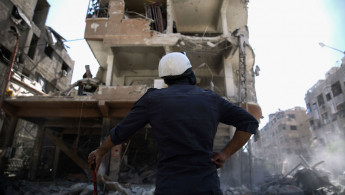White Helmets rescue centre forced shut after Idlib airstrikes
Rescue workers in Syria's northwestern Idlib province said they were forced to halt operations in a rebel-held town after airstrikes damaged their centre on Thursday.
The White Helmets rescue force said a salvo of rockets and shells hit their headquarters in al-Tamana in a southern part of Idlib province on Thursday morning, followed by airstrikes.
Mossab al-Qadur, the head of the centre, told AFP he was inside the building when it was struck by dozens of shells and rockets.
"When the shells stopped, we quickly got out. About 15 minutes later, a Sukhoi 24 (Russian jet) targeted the centre, which put it out of service," said Qadur.
"We had gotten the equipment out before the airplane targeted it, and we're all okay," he said.
The White Helmets announced on its Facebook page that "airstrikes caused huge damage in the building of the centre without causing casualties among the volunteers".
It published images of clouds of dust still hanging over the collapsed outer wall of a building.
The damage was also confirmed by the Syrian Observatory for Human Rights, which said Russian warplanes damaged the centre.
The last time the Britain-based monitor recorded a rescue centre being put out of service in Idlib province by hostilities was just three weeks ago.
Regime shelling and Russian airstrikes have targeted areas on Idlib's periphery in recent days, ahead of an expected assault on the province.
It is the only major rebel-controlled zone left in the country, two-thirds of which is now back under government control.
The area is home to around three million people, many of them reliant on humanitarian aid to survive.
More than half of Idlib is controlled by jihadists from Syria's former al-Qaeda affiliate, Hayat Tahrir al-Sham (HTS), while much of the rest is held by rebels backed by Turkey.
The regime holds a small southeastern sliver.
The United Nations and aid groups have warned a military campaign could spark one of the worst humanitarian catastrophes in a war that has already killed more than 350,000 people and displaced millions.
Some 2.9 million people live in Idlib and surrounding areas, among them one million children.
Many are rebels and civilians who were bussed out of their hometowns in other parts of the country that have come back under regime control.
HTS controls Idlib's Bab al-Hawa border crossing, through which an estimated 85 percent of humaniatarian cargo passes through. An influx of refugees or international pressure may cause Turkey to shut this crossing, putting thousands of civilians at risk.
Turkey, Russia and Iran last year designated Idlib a so-called "de-escalation zone", but that deal did not cover former al-Qaeda affiliate HTS.
Friday's summit in Tehran between key power brokers Erdogan, Putin and Iran's President Hassan Rouhani is expected to determine the scope and timing of any assault on Idlib.





 Follow the Middle East's top stories in English at The New Arab on Google News
Follow the Middle East's top stories in English at The New Arab on Google News
![The UAE is widely suspected of arming the RSF militia [Getty]](/sites/default/files/styles/image_330x185/public/2024-11/GettyImages-472529908.jpg?h=69f2b9d0&itok=Yauw3YTG)
![Netanyahu furiously denounced the ICC [Getty]](/sites/default/files/styles/image_330x185/public/2024-11/GettyImages-2169352575.jpg?h=199d8c1f&itok=-vRiruf5)
![Both Hamas and the Palestinian Authority welcomed the ICC arrest warrants [Getty]](/sites/default/files/styles/image_330x185/public/2024-11/GettyImages-2178351173.jpg?h=199d8c1f&itok=TV858iVg)